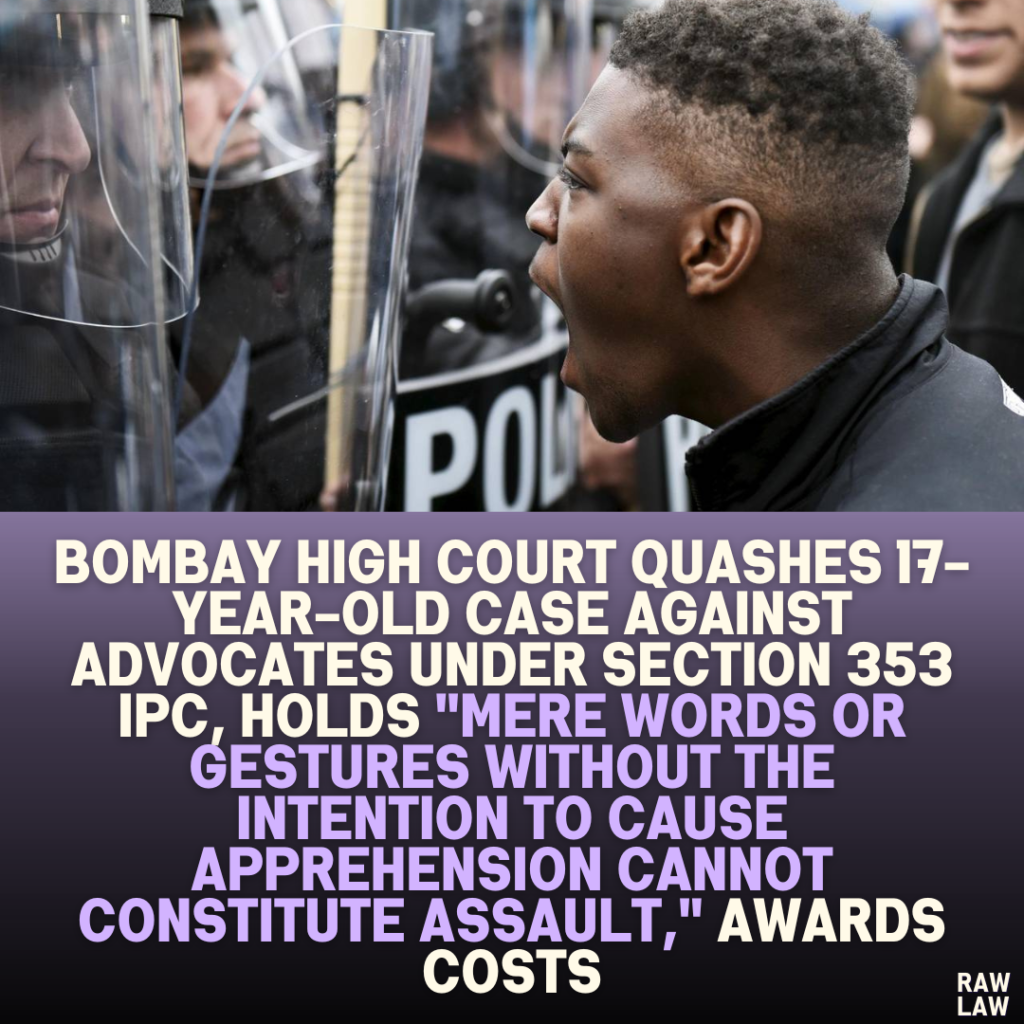Court’s Decision:
The Bombay High Court allowed the Criminal Revision Application, setting aside the order of the Additional Sessions Judge that rejected the discharge application of three advocates. The Court quashed the FIR under Section 353 read with Section 34 IPC, ruling that the allegations were patently improbable and the charges lacked the essential ingredients required to constitute the offense. The Court directed the State to pay ₹15,000 as costs to each applicant, recoverable from the complainant, a CBI officer.
Facts:
- Background of the FIR:
- In 2007, a CBI search was conducted at the premises of All Services Under 1 Roof Pvt. Ltd.
- The three applicants, including two practicing advocates and a law intern, arrived at the premises at the client’s request after the search had been ongoing for over 10 hours.
- Allegations:
- The FIR claimed that the applicants obstructed the CBI officers, refused to leave, and thereby disrupted official duties.
- Prosecution’s Case:
- Statements from five CBI officers alleged that the applicants caused obstruction by questioning their identities and remaining at the premises.
- Procedural History:
- The applicants were arrested, granted bail, and faced trial proceedings for 17 years without any substantive progress.
Issues:
- Whether the applicants’ actions constituted an offense under Section 353 IPC.
- Whether the trial court erred in rejecting the discharge application despite the absence of prima facie evidence.
- Whether the delay of 17 years violated the applicants’ fundamental rights to a speedy trial.
Petitioner’s Arguments:
- Lack of Essential Ingredients:
- The applicants contended that mere questioning of identity cards and remaining on the premises did not amount to obstruction or assault.
- Professional Duties:
- They argued that they were discharging their professional obligations as advocates and acted in good faith on the client’s request.
- Absence of Evidence:
- The applicants highlighted the identical nature of witness statements and the absence of any allegations of assault or use of criminal force.
Respondent’s Arguments:
- Obstruction Alleged:
- The prosecution argued that the applicants’ refusal to leave the premises obstructed the ongoing search.
- Minimal Evidence:
- While acknowledging the identical nature of statements, the State justified the continuation of the case on procedural grounds.
Analysis of the Law:
- Section 353 IPC:
- Requires the use of criminal force or assault to deter a public servant from performing lawful duties.
- The Court found no evidence of assault or criminal force in the applicants’ actions.
- Relevance of Gestures or Words:
- The explanation to Section 353 IPC clarifies that mere words or gestures without the intention to cause apprehension cannot constitute assault.
- Delay in Trial:
- The Court criticized the 17-year delay as a grave miscarriage of justice, particularly for a law intern who had suffered professional and personal stigma.
Precedent Analysis:
- Amit Kapoor v. Ramesh Chander:
- Emphasized that absurd and improbable allegations warrant quashing under Section 482 CrPC.
- Amer Khan v. State of Maharashtra:
- Held that Section 353 IPC must not be casually invoked, and the discharge is warranted when basic ingredients of the offense are absent.
Court’s Reasoning:
- Absence of Prima Facie Evidence:
- The Court noted that the prosecution failed to establish any ingredient of Section 353 IPC.
- The mere presence of the applicants did not halt or obstruct the search operation.
- Professional Conduct:
- The applicants’ presence was within their professional duties as legal advisors, and their conduct did not amount to obstruction.
- Misuse of Authority:
- The Court criticized the complainant for abusing legal provisions due to a personal affront.
Conclusion:
The High Court quashed the FIR and allowed the discharge application, emphasizing that the allegations lacked merit and the prolonged trial had unjustly stigmatized the applicants. It awarded costs of ₹15,000 to each applicant, recoverable from the complainant.
Implications:
This judgment reinforces safeguards against the misuse of Section 353 IPC and underscores the need for fair application of legal provisions. It also highlights the importance of a speedy trial to prevent undue harassment of professionals.




Pingback: Allahabad High Court: Widowed Daughter of Deceased BSNL Employee Qualifies as "Dependent Family Member" Under 1998 Guidelines if Dependency is Established; Exclusion Violates Articles 14 and 15 - Raw Law